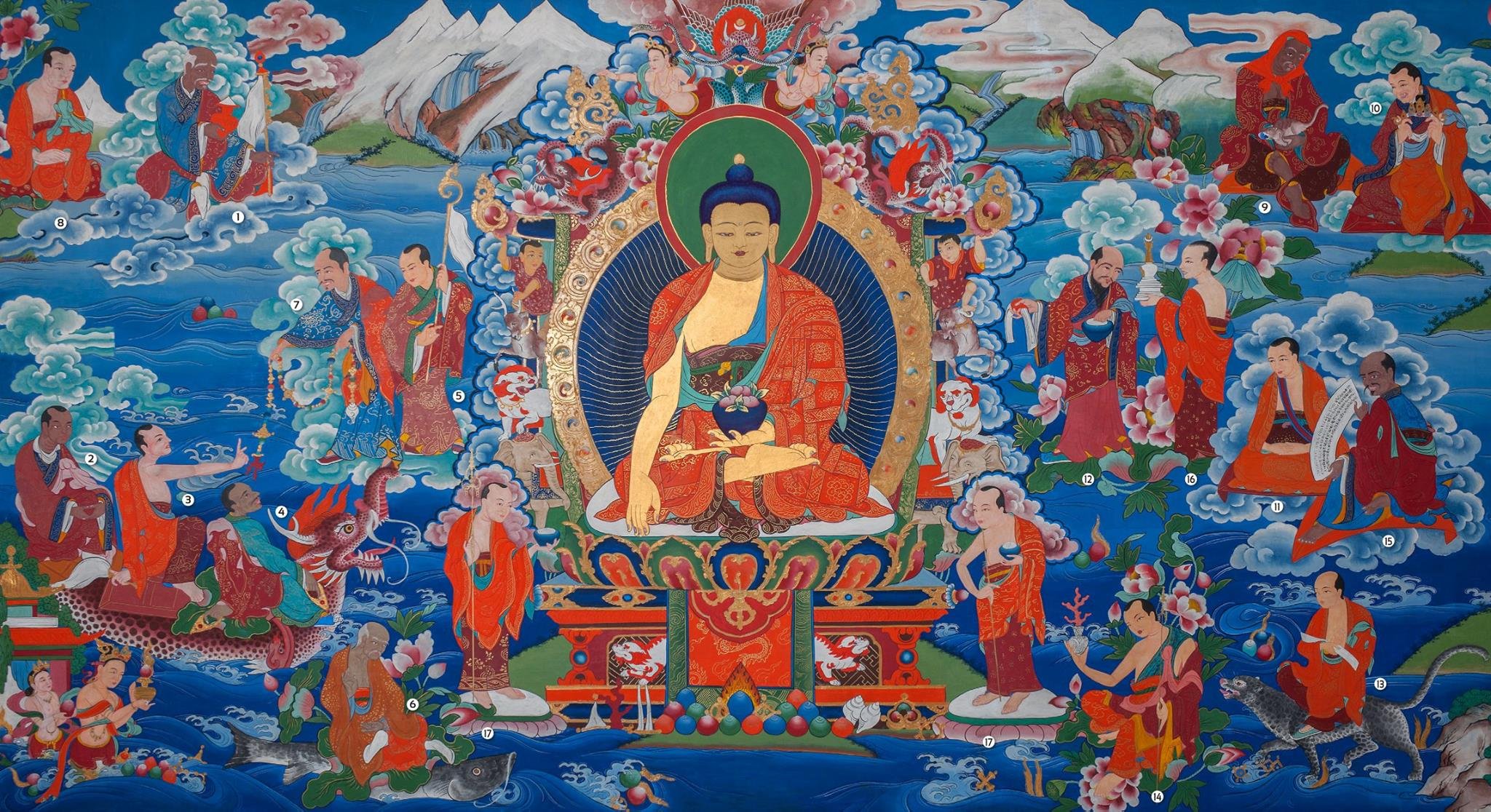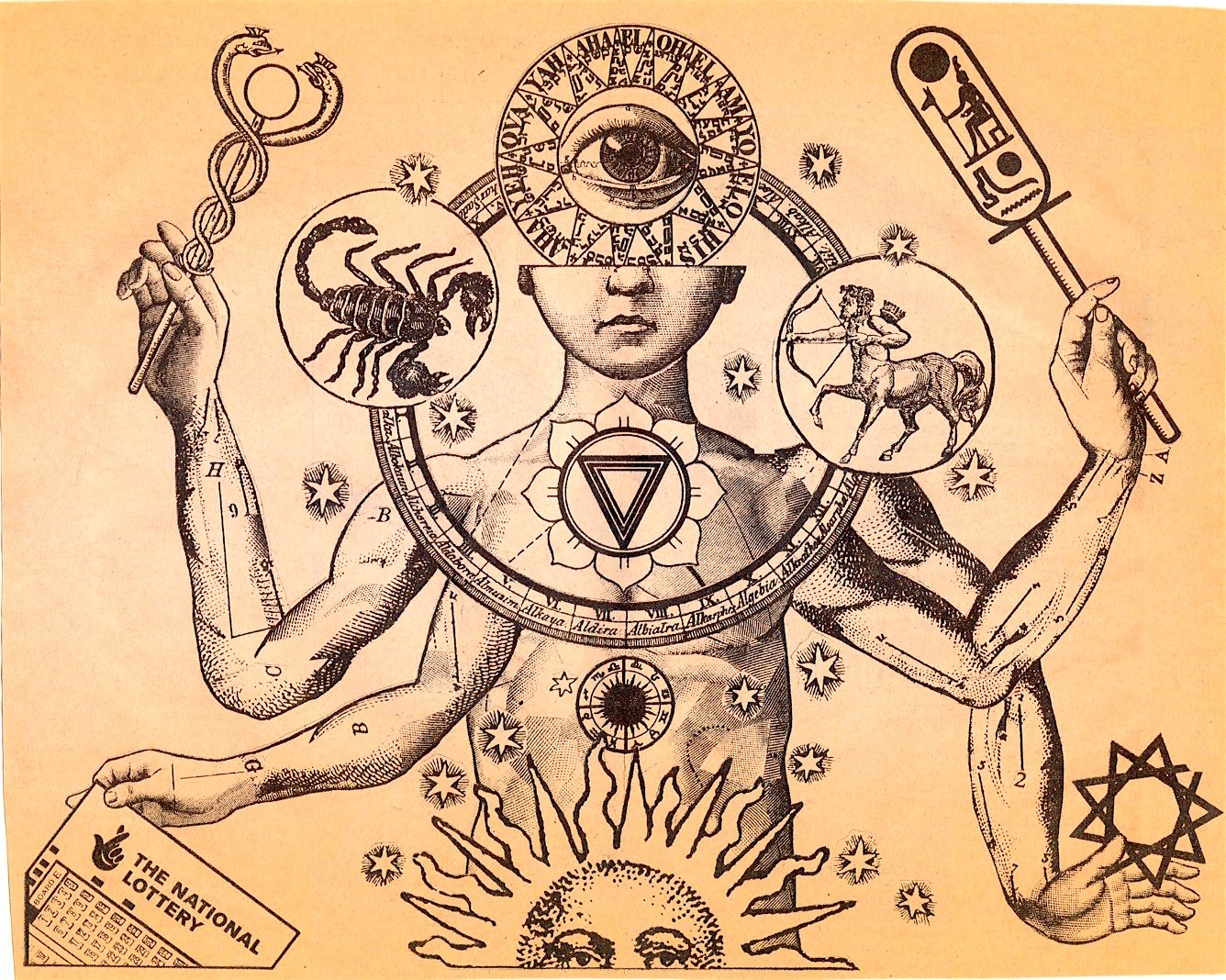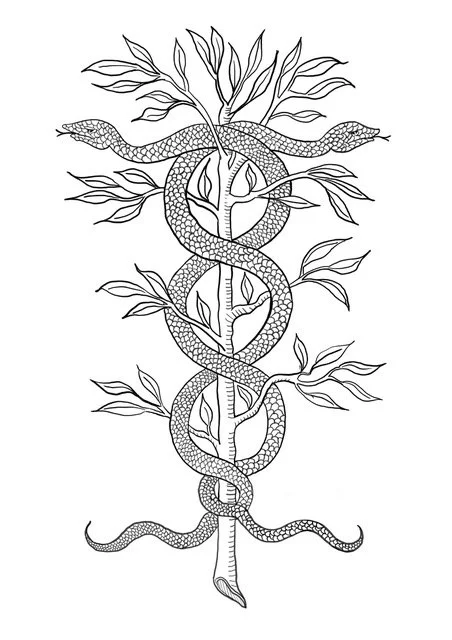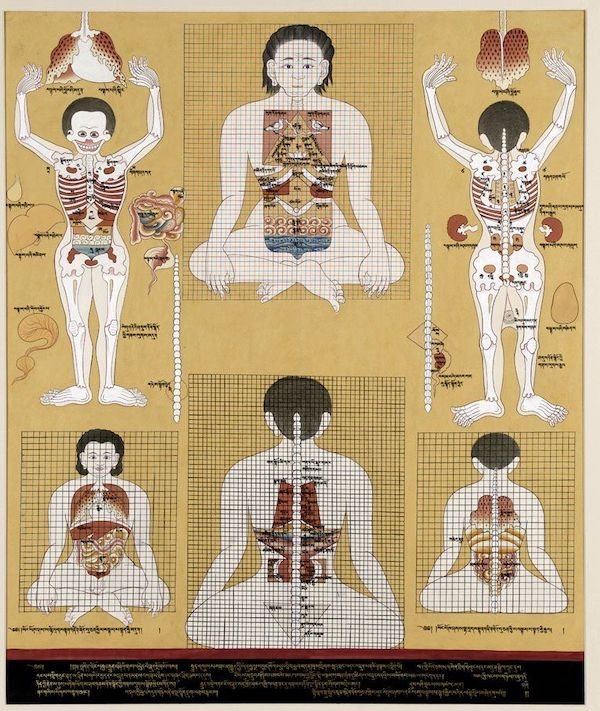THE MODULES
The Sacred Yoga Therapy Training is offered as 500-hour and 800-hour certificate programs.
Sacred Yoga Therapy Certificate Program Infographic
MODULE DESCRIPTIONS

Core Kundalini Medicine Modules KM1-KM6
THE 6 CORE MODULES GENERALLY TAKE PLACE OVER 6 CONSECUTIVE DAYS AND ARE OFFERED IN-PERSON (ONLINE UNDER SPECIAL COVID CIRCUMSTANCES), WITH THREE ONLINE FOLLOW-UP MEETINGS ALONG WITH A SMALL GROUP CHECK-IN.
KM1: DRAGON LINES
with Guru Dharam & Faculty
This is one of the foundation modules in the course and serves as an introduction to our concept of yoga therapy. We examine yoga philosophy and cosmology and introduce intake, assessment, therapeutic plans and ethics in yoga therapy. We study the elements through the lens of the TCM meridian system; we learn the emotional correlates to the elements, the course of the meridians, and some key acupressure/marma points. We apply this knowledge to deepen our understanding of how Kundalini Yoga practices work. We learn to balance the energies of the elements through kriya, meditation, pranayama and lifestyle.
This module includes:
Introduction to Clinical Practice, Assessment & Intake
Energetic Anatomy and Physiology
The Law of Polarity
The Law of Projection and Receptivity
Energy Maps
Elements
Meridians
Emotions and the Psychology of Organs
Acupressure/ Marma points
The Subtle Mechanics of Kundalini Yoga
KM2: SPHERES OF LIGHT & SUBTLE BODIES
with Guru Dharam & Faculty
This course is another foundational module in the program. We study several energetic models/frameworks that relate to the elements and subtle anatomy: the chakra system, the 10 Bodies of Kundalini Yoga, the doshas of Ayurveda, the vayus and the koshas. For each framework, we examine the physiology and psychology in harmony and disharmony. Students learn yoga therapy tools, such as asana, kriya, pranayama and lifestyle guidelines that can be applied within these frameworks. We also learn to analyze kriyas based on these systems. We introduce basic concepts from Ayurveda, approach the basics of 10 bodies numerology and present a brief overview of tongue reading and pulse analysis from both a TCM and Ayurvedic perspective. We work to develop our relationship with Shunia, the sacred space of inner silence.
This module includes:
Kundalini Kriya Analysis
Chakras, their physiological, emotional and psychological correlates
Asanas and their effect on the Chakras
Principles of Ayurveda, the Elements and the Doshas
Psychological and physical profiles of the Doshas
The 10-body model. How they function in health and disharmony
Numerology and 10 bodies model assessment.
Vayus and Koshas
Developing your relationship with Shunia, the sacred space of silence
KM3: THE TWISTED HAIR
with Guru Dharam & Faculty
Prerequisites: KM1, KM2
A Twisted Hair is the title given to an indigenous person who has been sent from their clan - say Buffalo - to learn the Medicine of another clan - say Bear - and bring it back to share and weave into a Twisted hair or luminous thread of wisdom.
In this module we bring together the frameworks that we have learned in previous modules and apply them to a series of common conditions – including stress, headaches, burnout, insomnia, ama/dampness, high and low blood pressure, depression, OCD and ADHD. We learn yoga therapy tools that are appropriate for each of these conditions. We examine the development and evolution of disease and learn how to set priorities in therapeutic plans. We address root and branch, the concept that the root cause of a condition differs from the symptomatology associated with the condition. Lastly, we learn to navigate the space where the model ends and the person begins, practically understanding the maxim "address the person, not the condition."
We have Kundalini - or another form of - Yoga as our base and we learn perspectives from Ayurveda and the wisdom of TCM to illuminate and deepen our Yogic wisdom and then apply it therapeutically. In this module we focus on the origin, causes and symptoms together with yogic approaches (yoga, meditation, lifestyle) for addressing the following conditions.
Depression
Attention Deficit Hyperactive Disorder (ADHD)
Obsessive Compulsive Disorder (OCD)
Burnout
Pain
Anxiety
Insomnia
Hyper/Hypotension
Migraine/Headaches
Ama/ Dampness/Phlegm
High and Low Blood Pressure
The development and evolution of
disease
Setting priorities in therapeutic plans
KM4: THE SACRED GEOMETRY OF KUNDALINI YOGA
with Guru Dharam & Faculty
Prerequisites: KM1, KM2
Kundalini Yoga can be described as a science of angles and triangles. In this module, we examine the mechanics underlying Kundalini Yoga so that we have a deeper understanding of how to apply it in a therapeutic process. This includes an analysis of the shapes and forms that underlie asana and kriya. We learn about the energetic triangles and the gates at the First, Fourth and Sixth Chakras. We examine the phenomenon of the navel point from various cultural viewpoints, including its foundational importance in determining stability of the physical, mental and emotional bodies. We compare and contrast the navel point with the Dan Tien and study different methodologies to center, cleanse and tonify the navel. We study the 6 climatic factors and learn how to recognize excess cold, heat, dampness, wind and dryness in the body. We discuss all of the above in relation to pathology and case histories. This module includes:
The Navel Point in harmony and disharmony
The Energetic Triangles
The 3 Gates at the First, Fourth and Sixth Chakras
The 6 Climatic Factors: HEAT, COLD, DRYNESS, DAMPNESS, WIND and SUMMER HEAT
How to recognize these climatic factors in the body
Yoga, meditation, pranayama, and lifestyle guidelines that address the climatic factors
Choosing the right kriyas and meditations
** All of the above are examined in relation to pathology and to case histories.
KM5: THE SKY OF MIND
with Guru Dharam & Faculty
Prerequisites: KM1, KM2
In this module, we examine yogic and Western models of the mind and its function, including the structures and various states and conditions of the mind. We present Kundalini Yoga specific models of the mind and relate them to concepts from the wider yogic traditions and knowledge from modern neuroscience. We examine several disharmonious conditions of the mind, including cold depression, obsession, addiction and PTSD and discuss protocols for working with clients with these conditions. We introduce the energetic concepts of the ojas and the jing and compare them to the western phenomenon of cerebrospinal fluid. We present yoga therapy tools for maintaining mental balance and clarity, including kriyas, meditations, pranayama and lifestyle guidelines.
This module includes:
The Yogic model of the Mind
Cultivating mental equilibrium
The 10 sections of your brain: their correspondences, function and interconnectivity
Breath for optimizing your cognitive faculties
The Twilight Zone of the Psyche
The Ojas and the Cerebrospinal fluid
Understanding the human body as a fully integrated multidimensional cognitive biosystem
Yogic psychology in harmony and disharmony:
Addiction
Cold Depression
Post Traumatic Stress Disorder
Obsession
** All of the above are examined in relation to pathology and to case histories.
KM6: RED THREAD, BLACK HAT & WHITE LOTUS
with Guru Dharam & Faculty
Prerequisites: KM1, KM2, KM3, KM4
We round out the last of the 6 core KM modules with an examination of energetic breakthrough practices. We learn yogic tools and transformational practices that work with the Elements of Water, Fire, Ether and Metal. We address how to use affirmations effectively and how to retrieve and imprint a previous condition of health and connectedness with the Red Thread approach. We study archetypal spiritual symbols and learn how to work with them via visualization and application. We learn about gender-specific issues, including the menstrual cycle, fertility, menopause, andropause. We study life transitions according to the cosmic cycle: Infinity, Life, Death, Rebirth.
This module focuses on Spiritual Symbols, Affirmations, Red Thread Empowerments, Internal Feng Shui, Shakti & Shiva issues and more.
This module includes:
How to achieve a metabolic shift in 24 hours
Imprinting a thought form into the body
Retrieving and imprinting a positive sensation or state of mind or a pattern of health into the present
How to apply spiritual symbols through mental visualization, projection, and imprinting into the physical form
How to evolve and transform using the Elements of Fire, Water, Ether and Metal
How to use affirmations effectively
A deeper understanding of gender-specific issues, including the moon-cycle
Life transitions according to the cosmic cycle: Infinity, Life, Death, Rebirth
MODULE DESCRIPTIONS CONTINUED

These modules are generally offered online, with the exception of Breathwalk (generally offered in-person, may be offered online).
AP1: ANATOMY & PHYSIOLOGY (100 hours)
with Denise Ferguson, Amanbir & Delia Tarlea
This module covers human anatomy & physiology in a way that is relevant for yoga teachers and yoga therapists. We study all the major systems of the body and their interrelationships, addressing common pathologies and disorders of these systems. We look at biomechanics and movement with an emphasis on maintaining healthy joints, bones, muscles and fascia. We address common complaints and injuries and contraindications for postures and practices. Aspects of myofascial, the nature of pain and pain drivers and research will all be addressed. The course is structured to enable students to learn via self-exploration, gaining knowledge and wisdom from listening, questioning and teaching to the group.
This module includes:
Human anatomy and physiology, including all major systems of the body and their interrelationships
Biomechanics and movement as they relate to the practice of yoga and the work of a yoga therapist.
Contraindications for postures and practices
Common pathologies and disorders of all the major systems
Common complaints and injuries
Aspects of myofascial, the nature of pain and pain drivers and research will all be addressed.
SV1: SUPERVISION (20 hours)
with Guru Dharam and Faculty
Prerequisites: KM1
Group Supervision provides yoga therapists in training a space to share, discuss and grow into more effective Kundalini Yoga Therapists. Each session features an introductory presentation by Guru Dharam or another member of the faculty on a relevant subject. After group response, we segue into discussion of case histories and the questions they pose. Group supervision allows us to apply the frameworks which we learn in the course to real life examples. We learn to navigate the space where the model leaves off and the individual, unique human being begins.
PROF1 & PROF2:
PROFESSIONAL PRACTICE AND PERSONAL DEVELOPMENT (30 hours)
with Paramananda and Harpriya
Prerequisites: KM1, KM2, PROF2
This course is taught in two 15-hour sections and includes:
PART ONE
This course sets the foundation for students to begin delivering yoga therapy in a clinical setting. We delve deeply into the ethics of yoga therapy and study the scope of practice and code of ethics of a yoga therapist. We address confidentiality, recordkeeping, boundaries and other issues pertinent to delivering yoga therapy. There is a strong emphasis on self-care as a practitioner. This course is intended to be taken before students begin their practicum.
(Part One is generally taught during a 3-day clinic weekend, which also includes some of the SuperVision hours)
PART TWO
This course sets the foundation for a professional practice of yoga therapy, including business planning, marketing, client care, and maintaining a robust referral network. Following on from the first part of this module, a strong emphasis is placed on personal practice and self-care as a practitioner as well as operating with sound ethics. The course emphasizes the importance of Continuing Professional Development and highlights pathways for students to continue developing after graduation. This course is intended to be taken toward the end of the course of study and is intended to support students as they graduate and set up their own professional practice as yoga therapists.
Ethics of yoga therapy
The scope of practice of yoga therapy
Self-care as a practitioner
Building a network for referrals
How and when to refer to allied professional networks
How to develop and maintain ongoing collaborative relationships with peers and other professionals in allied fields
Business development
Legal and regulatory issues pertaining to yoga therapy
Strategies for Continuing Professional Development
BIO1: BIOMEDICAL FOUNDATIONS (15 hours)
with Bernadette Devine ~ Paramananda
Prerequisites: KM1, KM2
This is a foundational course in allopathic medicine as is relevant to the work of a yoga therapist.
The Biomedical Foundations Course provides a bio-social-medical overview and map of the key body systems, organs as understood in healthy functionality and how systems are altered in imbalance and ill-health. The course sets the parameters of scope and understanding of where yoga therapy boundaries are held and how yoga therapy interfaces with the accepted traditional areas of clinical practices. This is to include common system / organ diseases, common biomedical treatments, concomitant pharmacology, researching biomedical papers, working with wider biomedical practitioners and pathways of care, for example cancer pathways.
This module includes:
Familiarity with commonly used drugs and surgical procedures
Familiarity with common medical terminology
Knowledge of how to reference current healthcare information, including pathologies, disorders, drugs, and surgical procedures
PSY1: PSYCHOLOGY AND DEVELOPMENT (40 hours)
with Patricia HarPremjeet
Prerequisites: KM1, KM2
This module considers the basic relational patterns that underpin human development, including early attachment processes that impact affect regulation and brain development. The module introduces current psychological research and practice in the diagnosis, measurement, and treatment of disorders of mood and personality commonly associated with negative health and well-being outcomes. A wellness/wholeness framework is presented as a contrasting approach to the conventional allopathic definition of illness, focusing instead on the common denominators of dis/ease – stress, loneliness, social isolation, fear, and anxiety, and the role of the unconscious psyche in fostering healing, transformation, self-expression, creativity, and the development of consciousness – versus emphasizing diagnostic labels indicative of a departure from “normal” functioning. Impact of adverse prenatal, lifecycle, and trans generational patterns are considered. This module further explores the current knowledge base and experiential understanding of yoga and meditation within the fields of depth psychology and integrative psychotherapy.
This module includes:
Basic knowledge of commonly occurring mental health conditions & treatments for these conditions
Basic relational patterns that underpin human development
Prenatal influences, the early attachment process and affect regulation
The impact of adversity and trans generational transmission of patterns on this process
Life cycle issues
Mainstream mental health concepts, interwoven with kundalini yoga theories & practices
DIV1: DIVERSITY, INCLUSION & CULTURAL APPRECIATION (10 hours)
with Vedya Amrita Bethel, Anjeli Placzek, Lindsey Roby, Kathy Haridev Latham and the Wahe Guru Family
In this course, we explore through up-to-date information, analysis and deep self-reflection and self-inquiry, how we can operate with inclusivity, empathy, tolerance, respect for all and a sense that "the other person is you." A panel of teachers addresses issues around BIPOC, LBGTQIA+, neurodiversity, colonialism, cultural appropriation & cultural appreciation. Yoga therapy students learn how to better understand the unique needs, strengths and challenges of various populations, so they can deliver yoga therapy with greater skillfulness and empathy. We also address how students can respect and honor the Indian origins of yoga.
RSC1: YOGA AND YOGA THERAPY RESEARCH (15 hours)
with Kathy Haridev Latham
Prerequisites: KM1, KM2
This module provides an overview of the current research on yoga and yoga therapy. We cover research methods and research design. Students learn how to find research and how to read and assess research studies. We address how to continue seeking out and incorporating research findings into evidence-based teaching.This module includes:
Overview of the current research on yoga and yoga therapy
Evidence-based practice
Understanding research methods and research design
Knowledge of how to find and assess research
GRP1: YOGA THERAPY FOR GROUPS (15 hours)
with Harpriya
Prerequisites: KM1, KM2
In this course, students will come to understand and appreciate the dynamics and mechanics of working safely and effectively with yoga therapeutic tools for groups and cohorts. We will explore how to approach work with couples, families and affiliated groups and communities. We address how to adapt the intake process to a group yoga therapy class setting and how to design yoga therapy programs for groups. Students will learn how to create agreements, facilitate courageous conversations and approach strategies and interventions with a group centered lens. Group process helps us move toward health and well-being through reflection, containment and group consciousness. This course will draw on mindfulness, contemplative self-inquiry practices as well as explore transformative techniques from Kundalini Yoga, Embodied Movement and group work from the world's traditions (namely from the Americas). Students will learn to work with people in diverse settings with an awareness of diversity and an ability to do deep relational work with others.
This module includes:
Designing, implementing, and evaluating group therapeutic yoga programs.
Group dynamics and techniques, including communication skills, time management, and the establishment of priorities and boundaries.
Techniques to address the specific needs of individual participants
BRW1: THERAPEUTIC YOGAWALK (BREATHWALK)
with Camilla Lund Elander
Therapeutic Yogawalk/Breathwalk combines walking, breathing techniques, meditation and nature. All deeply beneficial for our health in their own rights. Added together they comprise a powerful methodology to move toward greater physical health and inner balance. Yogawalking is a form of meditative yoga walk developed from kundalini yoga and other holistic traditions. Walking positively affects fitness, circulation, hormonal balance, heart rate, lung capacity, and emotional balance. The combination of different breathing techniques, walking and conscious attention brings clarity and calm. When our mind, our emotions and energy co-operate in a smooth flow, we gain more vitality and overall wellness. The course includes work on our group teaching skills and learning how to adapt and adjust yogawalk for various populations. We also cover the latest research on walking and the breath.
INT1: INTEGRATION HOURS (6 hours)
with Guru Dharam
Prerequisites: Modules KM1-KM6, AP1, BIO1, PSY1, DIV1
Integration hours serve to meld the information presented in Modules 1-6 with biomedical and psychological information presented in other modules. We review the convergences and contrasts between Eastern and allopathic worldviews. We also address any questions arising from the material.
MENTORED PRACTICUM (180 hours)
with Faculty Mentors
Prerequisites KM1, KM2, KM3, PROF1
The practicum consists of:
150 hours of yoga therapy delivery as the lead yoga therapist.
30 hours of 1-1 mentoring with faculty mentor
Mentors provide:
Individualized assessment, identifying strengths and areas for growth
Advice and feedback on cases, assessment and therapeutic protocols
Recommendations for reviewing material
Suggestions for further reading and homework to develop your skillset













